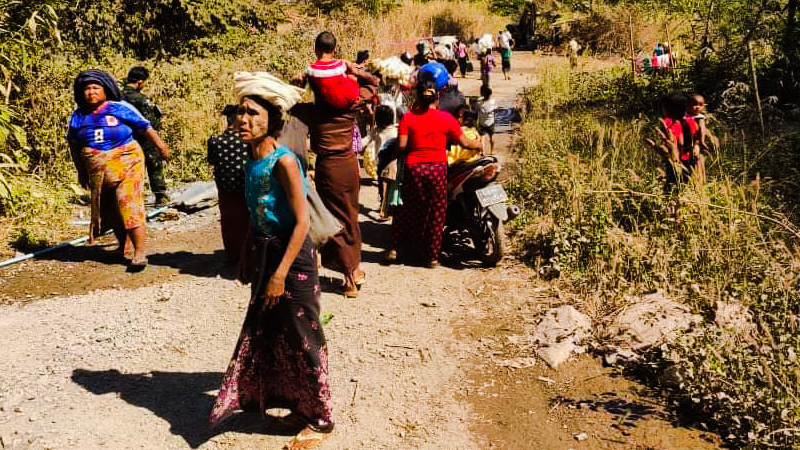
Thailand will establish a humanitarian safe zone and deliver aid to displaced people living on its border with wartorn Myanmar, the Thai foreign minister said Friday, a move Bangkok hopes will achieve the larger goal of establishing dialogue between the Burmese junta, ethnic armed groups and the civilian government-in-exile.
The plan will serve some 20,000 people in three towns in Myanmar, Foreign Minister Panpree Phahitthanukorn said at a press conference in Mae Sot. Thailand plans to begin delivering food and medical supplies within a month, he said.
Fierce fighting during Myanmar’s civil war, sparked by a military coup in February 2021, has forced more than 2.6 million people across the country to flee their homes, according to United Nations estimates.
As of Jan. 29, roughly 190,000 of them are in Kayin and Kayah states, along the western border of Thailand, according to the U.N. High Commissioner for Refugees, or UNHCR.
“It is good to have a chance to observe the area here in Mae Sot. It is suitable to be a base for humanitarian assistance, which will happen soon,” Panpree said Friday about the visit to the border. Thailand has not disclosed the exact location of the safe zone.
The Thai and Myanmar Red Cross Societies will implement the plan, monitored by the Coordinating Center for Humanitarian Assistance on Disaster Management of the Association of Southeast Asian Nations, or ASEAN.
It remains unclear if Myanmar’s junta has agreed with Thailand’s aid delivery plan. The Thai foreign ministry has also not engaged in dialogue with ethnic armed groups yet, Panpree said during the press conference.
Urging dialogue
Since the 2021 coup, the 10-member ASEAN has expressed disappointment that Myanmar has been unable to meet a five-point consensus, which included ending violence in the country, facilitating dialogue between all parties and humanitarian assistance by ASEAN.
Following the ASEAN foreign ministers’ meeting on Jan. 29 in Laos, Thai Vice Minister of Foreign Affairs Sihasak Phuangketkeow expressed hope that the aid would be seen as a non-political initiative.
Aid delivery is a good start to approaching the conflict, political analyst Panitan Wattanayagorn told Radio Free Asia (RFA) on Friday, but added that ASEAN members were concerned about political consequences.
“Once you deliver some of the assistance to one group, other groups that are fighting with that group could see it as an assistance for this group to fight against them,” he said.
“So this is a very sensitive and political issue anyway, although the Thais try to say it’s not a political issue. And this is what ASEAN members, many of them, are very concerned [about]. They didn’t know how and in what way this aid could be non-political.”
Thailand’s former administration was admonished by Indonesia’sminister of foreign affairs in 2023 for holding talks with the junta after the bloc began excluding high-level Myanmar officials from its meetings from the months following the coup.
RFA called ASEAN’s Coordinating Center for Humanitarian Assistance on Disaster Management for comment on their oversight of the project, but they did not respond by the time of publication.
Others working on border aid have called for expanded aid delivery, highlighting the immense need along bordering Kayah state as well.
“The people are starving over there,” Chalida Tajaroensuk, director of the People’s Empowerment Foundation. “The situation near Kayin state has simmered down so the government should consider expanding the relief aid delivery up north soon.”
